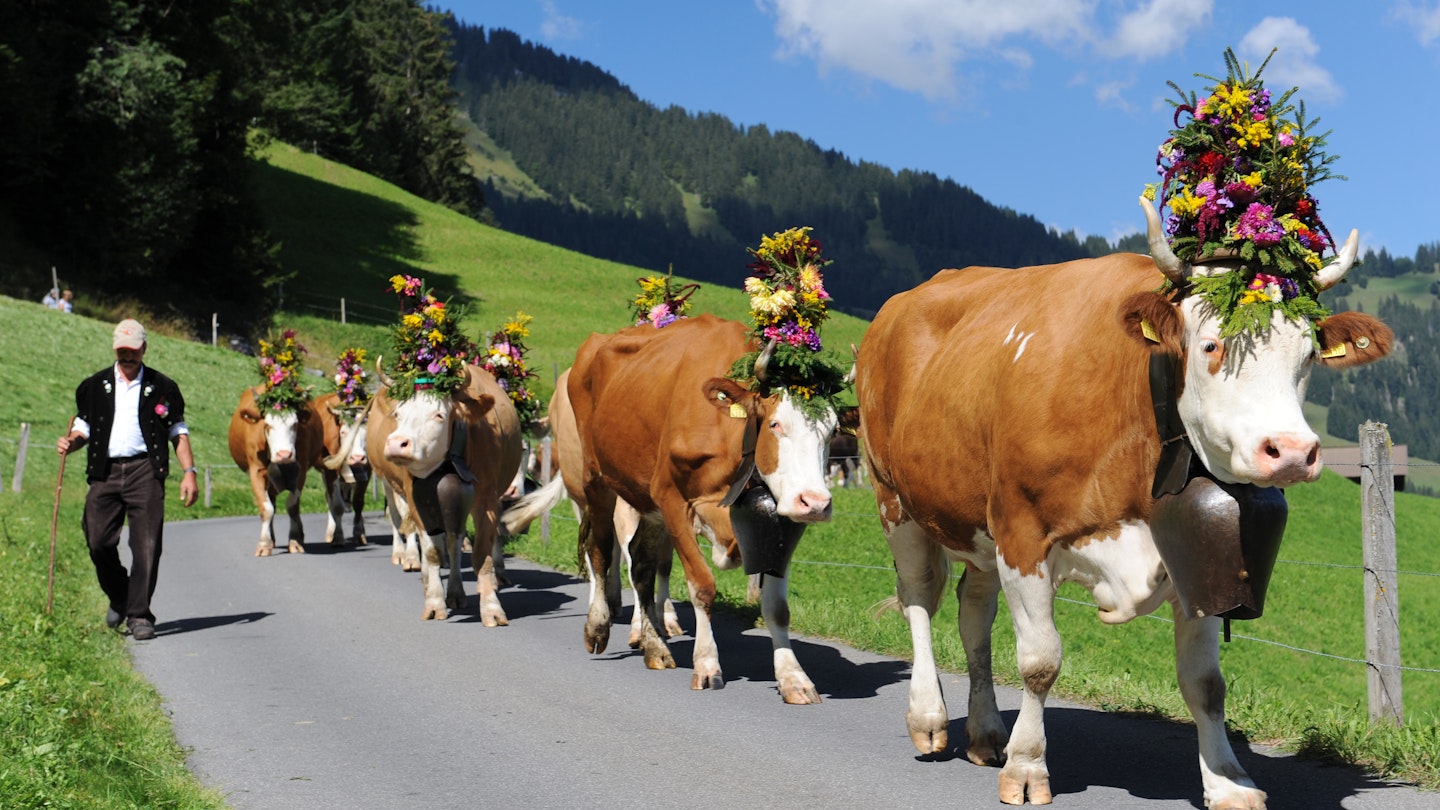
Cows might hold a holy place in India, yet they possess a remarkable significance within the breathtaking Swiss mountain landscape. Each spring, these bovine beauties embark on a journey from their valley barns to the alpine fields, ascending nearly 5,000 feet. There, they leisurely graze while producing milk. Swiss dairy farmers argue that the high altitude, along with the diverse flowers and herbs that the cows consume, contribute to the superior quality of Swiss dairy products. More than just a food source, Swiss cows have become the unofficial national animal of Switzerland, playing a crucial role in the country’s cultural heritage.
1. Enjoy Swiss Cheese
While many of us are acquainted with the classic Swiss cheese featuring holes, you may be surprised to learn that Switzerland boasts over 450 cheese varieties. These range from the iconic Emmental to lesser-known regional options.
A prime place to satiate your curiosity about cheese and the majestic Swiss cow is Gstaad. Renowned as a famous ski resort in the Alps, Gstaad houses 200 farms with approximately 7,000 cows. Here, you can engage in the Swiss Farmers Welcome You initiative for a guided dairy tour or to observe traditional Swiss cheese-making processes.
In a continuation of age-old traditions, farmers in most Alpine regions collaborate with cheese-makers who accompany the cows to mountain pastures each summer. Subsequently, the cheese is stored and distributed by local village cooperatives like Molkerei Gstaad. This cooperative offers tours that take you 82 feet underground into a cheese grotto teeming with over 3,000 aging cheese wheels. The specialty? Sliced and rolled Hobelkase cheese, a traditional Alpine cheese adhering to strict production regulations.

2. Indulge in Traditional Swiss Cheese Fondue
Cheese fondue can be found in almost every Swiss town. One notable example is the Restaurant Stubli in the Posthotel Rossli in Gstaad, a classic chalet-style restaurant established in 1823. Here, servers clad in traditional dirndl-style dresses serve bubbling cheese fondue accompanied by thick chunks of heavy Swiss bread and potatoes for dipping.
Another staple on Swiss menus is raclette. If you seek the perfect taste of this semi-hard cheese melted over potatoes, make your way to Walliserstuba in Brig, an Alpine village in the Valais region, where they host special raclette nights weekly.
For an open-air fondue experience, consider acquiring a “fondue backpack,” complete with all necessary ingredients and utensils from a Swiss cow dairy in Gstaad. You can then traverse to one of the five specially designed huts that resemble a giant fondue pot, enhancing your outdoor dining experience with breathtaking mountain views — listen for the sound of Swiss cows in the background!

3. Hike the Scenic Swiss Alps
Hiking in the Alps offers an opportunity to explore centuries-old trails that meander past picturesque lakes, meadows, and mountain huts, alongside — you guessed it — Swiss cows. With an array of gondolas available for easy access to the mountains, enjoying the Alps is attainable for hikers of every fitness level.
For breathtaking glacier views, take the train to Morel in Valais, where a series of cable cars effortlessly elevate you to the Aletsch Glacier, the longest in the Alps. An uncomplicated hike back along the Panorama Ridge Trail leads you past lush green slopes peppered with wildflowers, grazing Swiss cows (listen for the signature sound of their tinkling bells), and ample benches to pause and soak in the stunning snow-covered peaks.
Before descending via gondola, don’t miss the opportunity to grab a melted-cheese sandwich and a Rivella, a uniquely Swiss beverage crafted from milk whey at the Restaurant Derby in Riederalp.

4. Savor Swiss Milk Chocolate
Switzerland is celebrated for its delectable milk chocolate — in fact, the creamy, smooth chocolate we adore today was invented there. A stroll along Bahnhofstrasse in Zurich, the steeper street, invites you to explore numerous distinguished chocolatiers such as Lindt, Toblerone, and Cailler, the oldest chocolate manufacturer in the country. Most of Zurich’s chocolatier shops emerged in the late 1800s, while the more recent trend showcased by makers like Taucherli embraces a bean-to-bar philosophy, where the entire production process is handled in-house.
For an authentic Swiss experience, indulge in hot chocolate at Sprungli’s first-floor café overlooking Paradeplatz, established in 1859. To achieve complete chocolate immersion, don’t miss visiting Bachmann, where you’ll feel as though you’ve entered a chocolate paradise while ascending a glass staircase with chocolate flowing beneath it to Chocolate World, showcasing a chocolate buffet featuring a 215 square-foot flowing-chocolate wall. The aroma of rich chocolate is simply intoxicating.

5. Attend a Swiss Cow Festival
As fall arrives, Swiss cows journey back down to the valleys, prompting Alpine villages like Appenzell and Gstaad to honor these remarkable creatures with traditional festivals. These festive events are characterized by lively food, drinks, yodeling, and mountain prayers. Cow herders don embroidered traditional outfits and carry massive cow bells over their shoulders, guiding the beautiful bovines through town like beauty queens, adorned with decorative cow bells and wildflower garlands.




